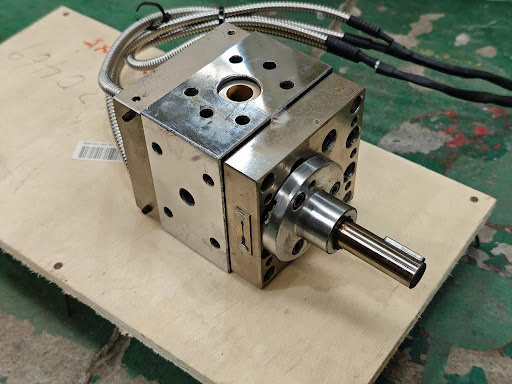What is a melt pump? Why is a melt pump needed on a twin-screw extruder?
In the modern plastic processing industry, twin-screw extruders have become the core equipment in the production of many high-end products due to their excellent mixing performance, plasticizing effect and high efficiency. Although twin-screw extruders perform well in handling material mixing and plasticizing, they still encounter some common problems in the actual production process, such as unstable melt flow, inconsistent product quality, and equipment overload. The emergence of these problems not only reduces production efficiency, but also may affect the quality and final qualification rate of the product. In order to optimize these problems, more and more efficient production lines choose to add melt pumps to twin-screw extruders. So, how does the melt pump play an important role in the twin-screw extruder to improve the efficiency, stability and precision of the production line? This article will analyze the functions of the melt pump and its advantages in plastic processing from multiple angles in detail
1. What is a melt pump?
Melt pump (Melt Pump) is a mechanical device used to transport molten plastics during plastic processing. It is usually installed between the twin-screw extruder and the die head. The function of the melt pump is to optimize the transportation of molten plastics during production by stabilizing the flow of the melt, accurately controlling the melt flow and pressure, and ensuring that the size, quality and appearance of the product meet strict requirements. The melt pump can improve the production efficiency of the extruder and reduce the fluctuation of melt flow by further pressurizing and controlling the flow, thereby ensuring the consistency of product quality.
2. Maintaining a stable twin-screw extrusion flow rate to solve production fluctuations
In actual production, the fluidity of the melt may fluctuate due to a variety of factors (such as temperature, pressure, viscosity, raw material composition, etc.). These fluctuations not only affect production efficiency, but may also lead to unstable quality of the final product and even equipment overload. The melt pump can greatly reduce the fluctuations in the melt flow by providing stable pressure and flow. Especially when dealing with raw materials with different melting characteristics and viscosities, the regulating effect of the melt pump is particularly significant. It can effectively eliminate the “back pressure” fluctuations generated by the melt inside the screw and ensure the smoothness of the melt flow.
3. Improving product consistency and meeting high-precision requirements
For many high-end plastic products, such as films, pipes, optical fibers, etc., the consistency requirements of product size, density and strength are very strict. Slight flow fluctuations may cause deviations in the size or performance of the final product, thereby affecting its pass rate and market competitiveness. The melt pump can accurately control the flow and pressure of the melt, eliminate fluctuations caused by factors such as pressure fluctuations of the extruder itself and screw unevenness, thereby ensuring that each batch of plastic products produced has highly consistent quality. This high-precision flow control can help companies meet strict quality standards, reduce scrap rates and improve market competitiveness.
4. Reduce the burden of twin-screw extruders and improve production efficiency
The main task of a twin-screw extruder is to fully mix, plasticize and heat the raw materials to a molten state suitable for extrusion. However, when processing certain high-viscosity materials, the melt fluidity is poor, resulting in increased equipment load, and may even lead to problems such as reduced screw speed and poor material flow. At this time, the melt pump plays a vital role. It provides additional pressure to enable the melt to flow smoothly through the mold and downstream equipment, reducing the pressure burden of the extruder itself and improving the melt fluidity, thereby ensuring the efficient operation of the extruder. The melt pump not only improves production efficiency, but also extends the service life of the equipment and reduces downtime caused by overload.
5. Enhance the processing capacity of high-viscosity materials
Twin-screw extruders are particularly suitable for processing high-viscosity or high-molecular-weight materials, such as engineering plastics, thermoplastic elastomers, etc. These materials usually have a high viscosity in the molten state, which can easily lead to poor melt flow inside the extruder, resulting in low production efficiency and even equipment shutdown. The melt pump provides additional pressure to enable the melt of these high-viscosity materials to flow smoothly, avoiding production interruptions or quality problems caused by poor melt flow. It is essential for the processing of high-viscosity and special materials, ensuring efficient production and product consistency.
6. Improve gas removal capabilities to ensure product quality
During the plastic extrusion process, gas is sometimes trapped in the melt, which not only affects the fluidity of the melt, but also causes quality defects such as bubbles and holes in the final product. The melt pump can help remove bubbles or gas in the melt through stable pressure output, thereby ensuring the density of the plastic melt during the extrusion process and ensuring that the appearance and mechanical properties of the final product are more stable. For plastic products that require high density and smooth surface, the role of the melt pump is particularly critical.
Guangzhou Hartek Technology Co., Ltd. is committed to the research and development and manufacture of small-scale experimental plastic processing and molding equipment. We provide customers with comprehensive technical consultation, perfect solutions and laboratory construction planning.
Hartek’s best-selling products include: small extruders, small cast film machines, small blown film machines, small sheet extrusion rolling mill, small twin-screw extruders, hot-melt twin-screw extruders, small three-roll mill, small internal mixers and small twin-roll open mills. Laboratory plastic machine products are fully functional, easy to operate and easy to expand. They can be used for formula development, process optimization, quality control, innovative research, design guidance, technician and student training, etc. They are suitable for professional colleges engaged in polymer material (plastics, rubber) research, product development or quality control of production departments of plastic processing enterprises, and technical training of professional schools.







